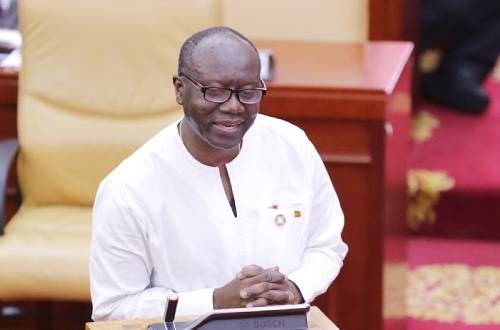
Ken Ofori-Atta is the Minister for Finance and Economic Planning
Finance Minister Ken Ofori- Atta has said consultations are still ongoing to factor in the concerns of stakeholders on the implementation of the E-Levy.
Speaking at a news conference on Monday (6 December), Ofori-Atta said despite concerns about the E-Levy, it still represents the government’s greatest opportunity to broaden the tax net.
“We are determined to enhance domestic revenue mobilisation, the presence of our proposal on the E-Levy is to widen the tax net and generate the required revenue to support entrepreneurship, youth employment to build our infrastructure especially roads and reduce our debts,” he said.
“Let me emphasise that the E-Levy represents our greatest opportunity to in the medium-term widen the tax base and meet the tax to GDP ratio of 20% as pertains among our peers.
“To lessen the impact of the E-Levy on consumers and subscribers, especially the vulnerable we shall work with all stakeholders to ensure that we respond to the need of the people.”
Ofori-Atta said adequate measures will be instituted to avoid any attempt to the evading of the E-Levy.
“We shall also ensure administrative measures are taken to avoid attempts at evading the E-Levy, The propose E-levy is largely progressive …”
He said the provision of a threshold demonstrates that the government is mindful of the vulnerable in the payment of the E-Levy.
Impact of E-Levy on digitalisation will be minimal
Menawhile, Kodjo Esseim Mensah-Abrampa, director general of the National Development Planning Commission (NDPC), has backed governments decision to introduce the E-Levy adding that it will help rake in more revenue.
Some economists have warned that the introduction of the E-Levy in the 2022 Budget will defeat government’s digitalisation drive and plans to roll out the digital currency – E-cedi.
However, speaking to Kofi Abotsi on Townhall Talk on Asaase Radio, on Friday (3 December), the NDPC boss said the impact of the E-Levy on digitalisation will be minimal and brief.
“So we have look at it in terms of if you come up with any policy will it affect another policy negatively, neutrally or positively, yes , it might affect digitalisation but that is for a very brief moment.”
“Yes we understand the payment of E-cost is not inelastic, so immediately you bring it there will be a reaction but the cost of cash payment we have looked at that , so the cost of cash payment is vey heavy such that a rationale individual will look at the value of the electronic transfer of cash and then come back.”
” So we do not expect that once you bring it people will accept , yes there will be a reaction but we know in the analysis that it will be a brief moment and people will come back to it because the cost of maintaining cash payment is very very high in our situation and is one of the ways that we can bring it.” the NDPC boss said.
Dr Mensah-Abrampa says studies show countries which initially resisted such levies have now embraced the policy.




